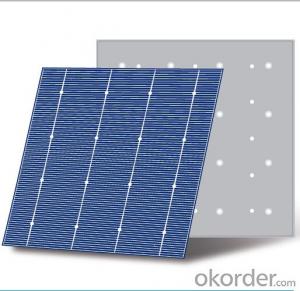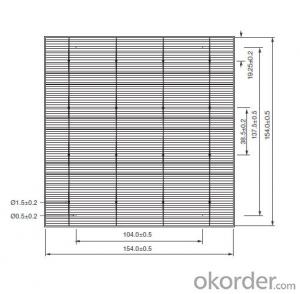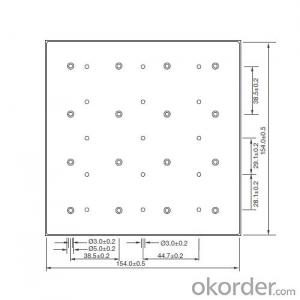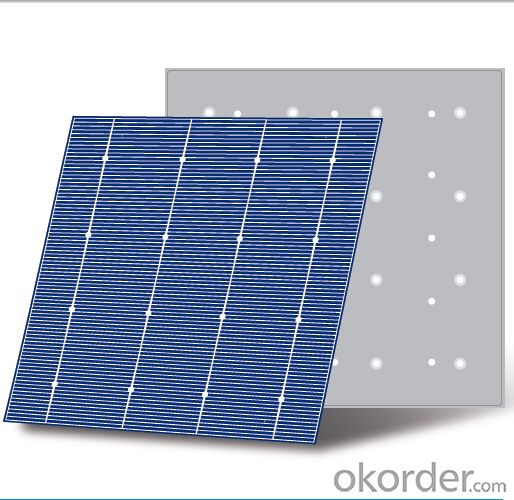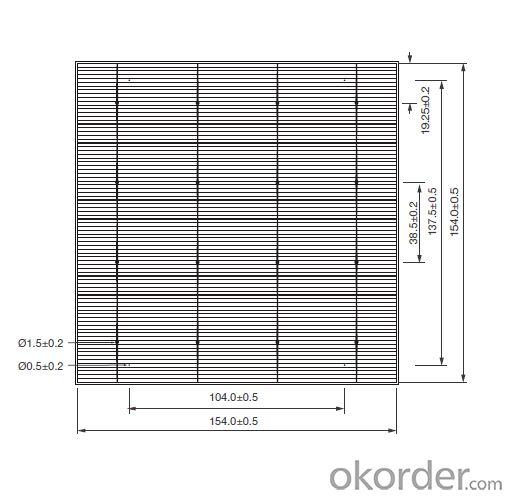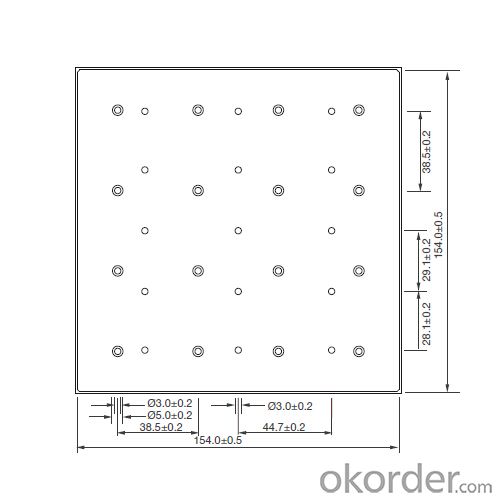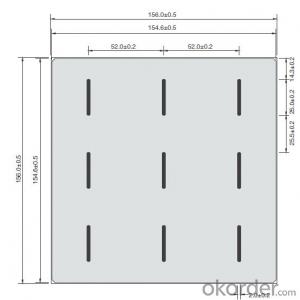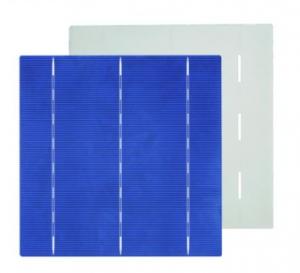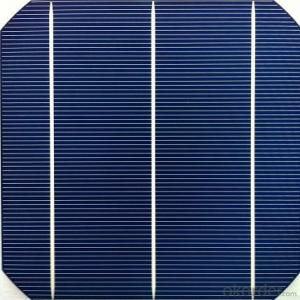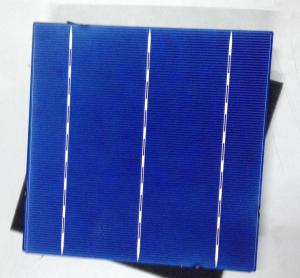Polycrystal Solar Cell Pn Junction Jac P6WR-0 (MWT)
- Loading Port:
- China main port
- Payment Terms:
- TT OR LC
- Min Order Qty:
- 1000 watt
- Supply Capability:
- 1000000 watt/month
OKorder Service Pledge
OKorder Financial Service
You Might Also Like
JACP6WR-0 POLYCRYSTALLINE SILICON SOLAR CELL
JA solar's high effciency MWT poly cell, manufacturing modules with more than 265W(6x10)power putput becomes easier than ever.
Futures:
Format:156mmx156mm±0.5mm
thickness:210um±30um
Front:Blue anti-reflecting coating (silicon nitride)
back:31 contact pads in diameter 3mm
Data sheet

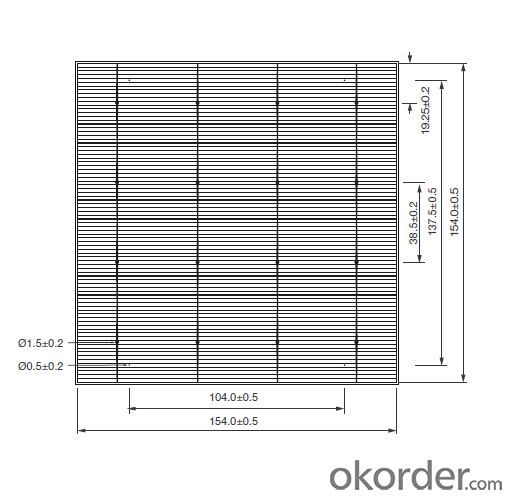
FAQ
We have organized several common questions for our clients,may help you sincerely:
①How about your company?
CNBM Solar photovoltaic (PV) Panel has various wattage from 1.5W to 315W to meet the demand of every customer. It is the optimal choice for both on-grid and off-grid power systems. CNBM Solar panel offers high performance of power warranty and good after sale service, we have professional people to reply your problem anytime.
CNBM International Corporation's products including Monocrystalline Solar Panel, Polycrystalline Solar Panel have received and enjoyed famous reputation in many countries and regions in the world .As a solar panel supplier in China, we strive to provide our customers with excellent service, superior products and unmatched value.
②How to guarantee the quality of the products?
CNBM Solar performance guarantees for 25 years
• 12 years guarantee for workmanship
• Timeliness of delivery
• Quality Products certified (TÜV, UL, CE, ISO)
③How long can we receive the product after purchase?
In the purchase of product within three working days, We will arrange the factory delivery as soon as possible. The pecific time of receiving is related to the state and position of customers.Commonly 7 to 10 working days can be served.
- Q: Can solar cells be used in electric bikes or scooters?
- Yes, solar cells can be used in electric bikes or scooters to harness the sun's energy and convert it into electricity to power the vehicles. By incorporating solar panels, these vehicles can become more sustainable and reduce their dependence on traditional energy sources.
- Q: What is the impact of shading on solar cell performance?
- Shading has a significant negative impact on solar cell performance. When a solar cell is partially shaded, it reduces the amount of sunlight reaching the shaded area, leading to a decrease in power generation. This is because shading disrupts the flow of electrical current within the solar cell, resulting in reduced efficiency and overall output. Even a small amount of shading, such as from trees, buildings, or debris, can have a noticeable impact on the performance of the solar cell. Therefore, it is important to carefully consider the placement and positioning of solar panels to avoid shading and maximize their efficiency.
- Q: What are the environmental impacts of solar cell production?
- The environmental impacts of solar cell production include the extraction and processing of raw materials, such as silicon, which can contribute to habitat destruction and water pollution. The manufacturing process itself requires energy and generates greenhouse gas emissions. Additionally, the disposal of old or damaged solar cells can pose challenges due to their composition and potential for toxic waste. However, when compared to the environmental impacts of fossil fuel-based energy production, solar cell production is generally considered to be much less harmful.
- Q: How do solar cells handle electromagnetic radiation?
- Solar cells handle electromagnetic radiation by converting it into electrical energy. When sunlight (which is a form of electromagnetic radiation) strikes the solar cell, it excites electrons, allowing them to flow through the material, creating an electric current. The materials used in solar cells are designed to efficiently absorb and convert a wide range of electromagnetic radiation, including visible light and some parts of the infrared and ultraviolet spectrum.
- Q: Which Solar Panel Type is best? Polycrystalline panel or PV Module Monocrystalline Solar cell panel, or thin film?
- The Monocrystalline silicon solar panels requires less space to operate, so it is one of the best if you don't have a huge space to install it.
- Q: The working principle of solar cells includes the three processes
- The solar cells absorb photons with a certain energy and excite unbalanced carriers (photogenerated carriers) - electron - hole pairs. These electrons and holes should have sufficient life, and they will not disappear after they are separated.
- Q: Is solar cell technology very developed and v applied to life a lot?
- Yes as far as I know.
- Q: What are the main components of a solar cell?
- The main components of a solar cell are a semiconductor material, typically silicon, which absorbs sunlight and generates electricity; metal contacts that collect and carry the generated electricity; and a protective layer, usually made of glass or plastic, to shield the semiconductor material from external factors.
- Q: Can solar cells generate electricity on cloudy days?
- Yes, solar cells can generate electricity on cloudy days, although their efficiency is reduced compared to sunny days. The cells can still convert the diffuse sunlight that penetrates through the clouds into electricity, albeit at a lower rate.
- Q: What is the role of charge controllers in solar cell systems?
- The role of charge controllers in solar cell systems is to regulate the flow of electrical current between the solar panels and the batteries. They prevent overcharging of the batteries by monitoring the voltage and current levels, ensuring efficient charging and maximizing the lifespan of the batteries. Additionally, charge controllers protect the batteries from being drained excessively by disconnecting the load when the battery voltage drops to a certain level. Overall, charge controllers are crucial in maintaining the integrity and performance of solar cell systems.
Send your message to us
Polycrystal Solar Cell Pn Junction Jac P6WR-0 (MWT)
- Loading Port:
- China main port
- Payment Terms:
- TT OR LC
- Min Order Qty:
- 1000 watt
- Supply Capability:
- 1000000 watt/month
OKorder Service Pledge
OKorder Financial Service
Similar products
Hot products
Hot Searches
Related keywords
